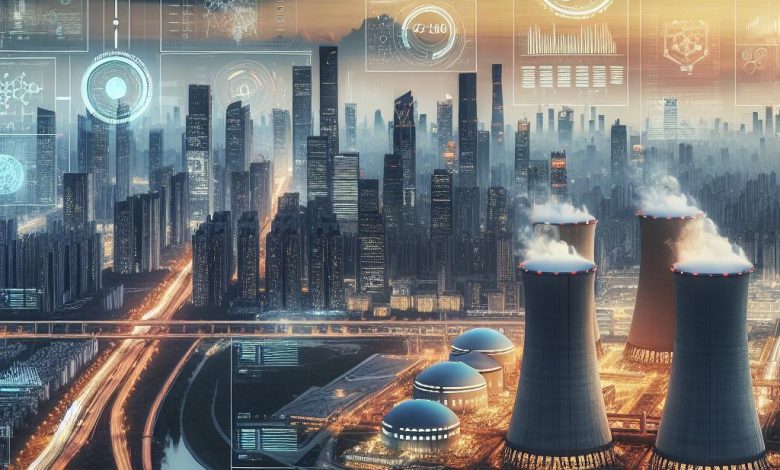
Table of Contents
Rising Demand for Nuclear Energy
In a world grappling with the twin challenges of climate change and surging electricity demand, nuclear energy is now emerging as a significant part of the global energy conversation. This renaissance of nuclear power marks a distinct generational shift in attitudes towards an energy source that has long been mired in controversy and skepticism, particularly since notable catastrophes like Three Mile Island and Chernobyl.
At the forefront of assertions about nuclear's expanding role is Rafael Mariano Grossi, the director-general of the International Atomic Energy Agency (IAEA). His interview with The Associated Press at the COP28 U.N. Climate Summit shed light on the changing perceptions surrounding nuclear energy. Grossi expounded on the importance of nuclear energy as a means to combat climate change and explained how our increasing needs for electricity are driving this shift. Nuclear power's profile at such a significant international environmental conference indicates the radical transformation of what was once a "taboo" topic into a viable and crucial part of the global energy strategy.
Yet, Grossi acknowledged complex challenges in ensuring that the expansion of nuclear energy is carefully managed and monitored. Specifically, he pointed to the difficulties faced by the IAEA in overseeing nuclear programs in volatile regions, citing the example of Iran following the breakdown of its 2015 nuclear agreement with international powers. Such circumstances underscore the potential risks associated with nuclear proliferation, especially in the Middle East—a region already fraught with tensions.
Despite the complexity and the potential for a "domino effect" of countries seeking nuclear capabilities mentioned by Grossi, the focus remains on the opportunities that nuclear energy presents. The anticipated major nuclear agreement at COP28 not only signals a collective endorsement of nuclear power but also suggests a transformative moment wherein nuclear energy could become more accessible to nations worldwide. Grossi's conversation with French President Emmanuel Macron prior to the summit hinted at a forthcoming public commitment to nuclear energy, unprecedented in its backing from world leaders.
The argument in favor of nuclear energy is markedly strengthened by its environmental benefits. Nuclear power plants do not emit greenhouse gases during operation, making them an attractive option for reducing global emissions and battling climate change. This positive attribute, however, is counterbalanced by the well-known concerns of environmentalists regarding the long-lived radioactive waste produced by nuclear reactors.
As influential figures like President Macron prepare to address the congregation at COP28, the proximity of the talks to Iran—an emblematic focus of nuclear scrutiny—serves as a contextual backdrop to the discussions. The global community watches and waits to see how nuclear energy will be integrated into our collective effort to shape a sustainable and secure energy future in the face of our epoch's most pressing environmental crises.
Monitoring Challenges and the Iranian Nuclear Program
Since the disintegration of the 2015 nuclear deal, the International Atomic Energy Agency (IAEA) has encountered severe obstacles in its efforts to surveil Iran's nuclear endeavors. The collapse of this accord has led to an environment marked by reduced transparency and heightened concerns. IAEA's Director-General Rafael Mariano Grossi has highlighted the inherent risks associated with the lessening of oversight, describing the current situation as one that could potentially foster nuclear proliferation—a development that threatens regional and global security.
Grossi acknowledged the gap in the IAEA's knowledge owing to the restricted access that followed the breakdown of the agreement. Since February 2021, international nuclear inspectors have not accessed Iran's centrifuge production facilities. This lack of oversight raises alarming possibilities that centrifuges, essential for uranium enrichment, could have been clandestinely diverted without the IAEA's knowledge. "We don't know—and our estimation is that production is continuing," stated Grossi, underlining the severe implications of the situation.
The challenge is compounded by Iran's move to withdraw permissions from veteran IAEA inspectors. This step significantly inhibits the Agency's capability to monitor Tehran's nuclear program, which is of particular concern given that Iran has amassed enough enriched uranium to potentially construct several atomic bombs, should it choose to do so. Despite Iran maintaining that its nuclear program is entirely peaceful, and U.S. intelligence assessments suggesting Iran isn't actively pursuing the creation of a nuclear weapon, the IAEA's handicapped monitoring capacity stands as a crucial obstacle to verifying these claims.
Grossi likened the situation to removing key players from a soccer team, referring to the stars Lionel Messi and Cristiano Ronaldo to illustrate the impact of barring seasoned inspectors: "It's like, you know, they took Messi out of the team... and they say, 'You still have a team,' but yeah, but let's be fair and play fair." His analogy succinctly conveys the gravity of Iran's restrictions on IAEA inspectors and the consequential impairment of the Agency's oversight function.
This complex scenario underscores the need for a vigilant international approach to nuclear nonproliferation, especially in the face of rising regional tensions and the risk of other nations following suit in bolstering their nuclear arsenals or capabilities. Grossi's remarks point to the delicate nature of the issue and the crucial role that robust and unfettered IAEA monitoring plays in maintaining a nuclear-safe world.
Political and Safety Concerns Surrounding Nuclear Energy
While the proactive stance on nuclear energy as a tool against climate change is gaining traction within the global community, key obstacles in the form of political and safety concerns remain. Rafael Mariano Grossi, while optimistic about nuclear energy, doesn't shy away from acknowledging the qualms that persist about nuclear waste, a contentious issue that has long been a point of contention among environmentalists. The debate centers around the long-term storage and management of radioactive waste, an unsolved issue that fuels opposition to the expansion of nuclear power, despite its negligible greenhouse gas emissions during operation.
In the shadow of these waste disposal concerns are heightened safety issues that have been thrown into relief by the ongoing conflict in Ukraine. Grossi underscored the vulnerability of nuclear reactors caught in the crosshairs of warfare, emphasizing the perilous repercussions of military actions targeting critical energy infrastructure. Such scenarios amplify the inherent risks of nuclear power and necessitate an unwavering commitment to safeguarding nuclear facilities under all circumstances.
Moreover, political intricacies entangle the scientific narrative of nuclear technology, muddying practical considerations with geopolitical interests. A prime example is the dilemma faced by Japan as it grapples with the disposal of treated and diluted wastewater from the Fukushima nuclear disaster. Despite assurances from the IAEA that the levels of tritium in the discharges will have minimal environmental and health impacts, the decision has encountered political pushback and regional reservations, with China banning Japanese fish imports over fears of contamination. This controversy epitomizes the challenge of aligning scientific guidance with political and public acceptance, even under rigorous independent monitoring and oversight by experts.
These political and safety concerns entwined with nuclear energy elucidate the complexities that underpin the sector's potential growth. As world powers show signs of warming up to nuclear power as a crucial player in the journey to a low-carbon future, it remains critical to address these multifaceted issues to ensure that both the promise and the precautions of nuclear energy advance in lockstep.
The International Landscape and Nonproliferation Efforts
The geopolitical interplay of nations at pivotal gatherings like COP28 often mirrors the broader international landscape, particularly where nuclear policy is concerned. Striking instances of this were the reactions of regional actors like Israel and Iran during the summit. Iran's President Ebrahim Raisi notably opted to boycott the event, ostensibly due to the Israeli officials' presence, underscoring the deep-seated tensions between the two nations and casting a shadow on collaborative environmental endeavors.
Amidst this volatile regional backdrop, the IAEA Director-General Rafael Mariano Grossi has vocalized a pressing need for Israel to accede to the Nuclear Nonproliferation Treaty (NPT). The NPT is a landmark international treaty with the goal of preventing the spread of nuclear weapons and weapons technology, promoting cooperation in the peaceful uses of nuclear energy, and furthering the goal of achieving nuclear disarmament. Grossi's call reflects a broader desire to bring unmonitored nuclear programs into an internationally recognized framework that enhances transparency, builds mutual trust, and reduces the risks of nuclear tension and conflict.
Adding to the urgency of bolstering nonproliferation efforts is the observed trend of major powers like China, Russia, and the United States increasing their nuclear arsenals. Grossi characterizes this escalation as a concerning and "very disturbing trend" with the capacity to elevate the risk of worldwide nuclear proliferation. The expanding nuclear capabilities of these nations could potentially embolden other countries to develop or enhance their own arsenals, a scenario that would dramatically undermine global nonproliferation objectives and could destabilize international security.
This drive towards augmenting nuclear weaponry echoes against a countervailing imperative for disarmament and nonproliferation, raising questions about equitable security and the rationale of nuclear deterrence. The confluence of these developments requires a nuanced and concerted diplomatic effort that reconciles national security interests with the overarching need to mitigate the risks of nuclear proliferation and keep alive the aspirations for a world with fewer nuclear weapons, or ideally, none at all.




